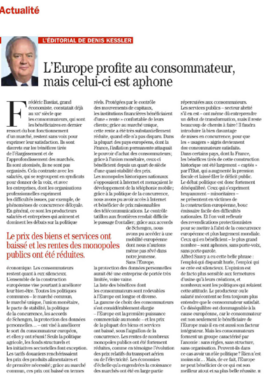Europe is good for consumers but they have no voice - Editorial for Challenges by Denis Kessler
June 13, 2019

Denis Kessler, Chairman & CEO of SCOR, discusses economic, political and financial current events in his editorial for the French publication Challenges.
The renowned economist Frédéric Bastiat recognized in the 19th century that consumers, who are the ultimate beneficiaries of a properly-functioning market, have no voice to express their satisfaction. They are quiet about the benefits they derive from broader and deeper markets. They are fragmented and disorganized. This stands in contrast with salaried workers, who form unions to amplify their voice, and with companies, whose professional bodies point out the problems caused, for example, by unfair competition. In general, it is the producers – employees and companies – who dominate the debate on economic policy. Consumers, in contrast, remain silent.
Nonetheless, the entire European project has been aimed at improving their well-being. All the common policies – the common market, the single market, the monetary union, the stability pact, competition policy, the Schengen agreement, the protection of personal data, etc. have endeavored to improve the lot of the European consumer. And they have succeeded! Only the agricultural policy, the structural funds and the sectoral initiatives stand out as exceptions. Customs duties made food and other basic products more expensive; thanks to the common market, these prices have declined in real terms. Protected by restrictions on the movement of capital, financial institutions benefited from a guaranteed income stream from their customers; thanks to the single market, this was substantially reduced or eliminated. In most European countries, including France, inflation was eroding consumer purchasing power; thanks to the monetary union, consumers have enjoyed nearly stable prices for a quarter-century. Long-standing national monopolies opposed the internet and threatened the development of mobile telephony; thanks to competition policy, we have been able to access the internet and benefit from reasonable telecommunication prices. Fastidious border controls made it difficult to cross borders; thanks to the Schengen agreement, we now have European mobility that we would never have dreamed of in our youth. And without the European Union, the protection of personal data would have had a very limited scope, indeed.
The list of benefits that consumers owe to Europe is long and diverse. The range of consumer choice has been considerably expanded – Europe is the world’s largest economic power – and competition has pushed down the prices of most goods and services. The guaranteed income many monopolies enjoyed has been sharply reduced, as exemplified by air transport and electricity price trends. A large proportion of the economies of scale that market growth has generated have been passed on to consumers.
Even public services – a protected sector if ever there was one – have had to start reinventing themselves, but much remains to be done. They need to be subjected to much more competition, so that embittered “users” become satisfied customers.
In certain countries, including France, the benefits of this unprecedented project have been “captured” by the State, which has increased the tax burden while allowing government deficits to climb.
So the political debate is very unbalanced. The loud minorities present themselves as victims of the European project, which is an easy scapegoat for domestic problems. And they have once again trotted out their protectionist demands to shield themselves from European – and more broadly, global – competition. Those who benefit – the vast majority – have no voice, no platform from which to speak and no spokesperson.
Alfred Sauvy once said that jobs that are eliminated cry out, while jobs that are created remain silent. The public are naturally more sensitive to factory closings than to new production facilities, and politicians are eager to be their relay. A disgruntled employee or frustrated producer will always be heard over the satisfied consumer. This imbalance is prejudicial to the European cause, because the consumer is not only the beneficiary of the European project but also its integrating factor. Yet consumers form a group characterized by what French philosopher Émile Durkheim called “anomie”: they have no rules, no structure, no organization. Given this, can they play a political role? Nothing could be less certain. Which means that Europe is not benefiting from its greatest asset and its most successful achievement.
